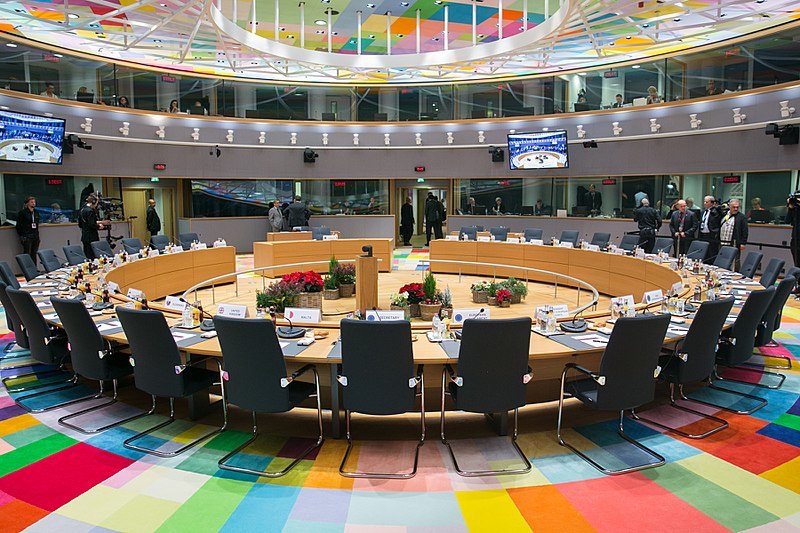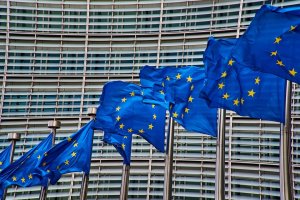Europe will soon have a new President of the European Commission, a new president of the European Council, and a new chair of the ECB. A new European Parliament is already in place. The challenges facing Europe however have not changed significantly, and how Europe responds will have consequences far beyond Europe. Economic inequality, climate change, technology, migrations, terrorism, trade wars, Brexit, demography, the eurozone stabilisation fund, to name just a few, are pressing and complex problems that demand equally articulated, perhaps creative and undoubtedly bold solutions. Many of these challenges will need to be addressed not only at the European level but within a reinvigorated multilateral framework.
That framework will need to reflect the full complexity of the contemporary world. We live in a world where China is the second largest national economy, and where critical problems cannot be addressed without including the voices of the many growing economies of Africa, Asia, Latin America and the Middle East. At the same time it is a world where the values on which the European Union was founded— democracy, human rights, and the rule of law are under attack, and Europe must seek a reinvigorated multilateral framework that seeks to lift up these values in our time.
The world and its economies are changing fast and so is the world of work. Globalisation and un-regulated markets did not deliver as their promoters promised they would - Instead we have seen financial crisis, economic volatility and above all rising inequality. The richest 1% are on course to hold two-thirds of the world’s wealth by 2030. The combination of radical change and radical in- equality makes ordinary people fear for their futures. This is unacceptable.
If we do not have a more equitable world economy we will face a dark future. The effects of the last financial and economic crisis has evolved in many ways to a social and political crisis - a clear effect is the increase in the extreme right across a number of European countries and around the world. We can see clearly today that Brexit is in a way being driven by some extreme right, and that the desire of some of those promoting it is to weaken social protections in the UK. But Britain is not unique in facing threats from the far right. Germany, Italy, France, Hungary, Romania each face the growing political power of parties and movements of the far right that oppose tolerance, cooperation and multilateralism, and there is no question that President Trump’s remarks at the time of a 2017 clash between neo-Nazis and anti-Nazi protestors in Charlottesville that there were “good people on both sides” may have given more legitimacy to some of these movements.
This is the environment in which Portugal will have the Presidency of the EU in the first semester of 2021. Portugal has already announced Africa will be its number one priority, and that we are going to have an EU-Africa Summit. This will provide a unique opportunity to design a true partnership between Europe and Africa. Both Europe and Africa can benefit from such a partnership. If properly designed it can bring economic growth and job opportunities for Africans and Europeans, tackle climate change in both Europe and Africa, provide new investment platforms for businesses and better manage migration flows. Such an initiative has the hope of rekindling a global public’s belief in the relevance of international institutions and international dialogue for addressing the world’s most pressing problems.
Many African leaders today face overwhelming challenges related to climate and the political destabilization that comes in the wake of desertification. At the same time Africa is a continent of increasingly networked citizens and consumers. Both African leaders and citizens will be looking to the EU to bring to the Summit a concrete agenda and one that focuses on delivery. We need to be aware that more than twice as many African country Presidents made it to the last China - Africa Summit than to the UN General Assembly and China’s most senior leaders visited Africa 79 times between 2007 and 2017. It is clear many of Africa’s leaders see their countries’ relationship with China providing concrete benefits, from export markets to high speed rail technology, and as a result China’s influence in Africa has grown. How can the EU come up with a pragmatic agenda that provides concrete, tangible benefits to African countries and to Europe? That agenda must move past previous models that seemed to end up resuming to aid relationships that were often perceived as paternalistic.
Any reboot of the Africa-Europe relationship must begin with the EU working alongside African leaders instead of imposing a development agenda on Africans. Europe needs to work with its African partners to develop a genuine partnership between both continents; one that allows Africa to create new economic prospects for its people. Africa has democratically elected leaders and it is their agendas that need to be delivered. This means bringing the various European develop- ment agencies to work together and create synergies through more and better coordination of their development efforts.
The first issue this new mutualistic approach needs to be brought to bear is the emergency in the Sahel—the semi- desert nations to the south of the Sahara. The five countries of the Sahel - Mauritania, Mali, Niger, Burkina Fasso and Chad - are home to 78 million people today and over 200 million in 2050 - the Sahel is highly affected by draught, highly susceptible to climate change and has seen a high number of terrorist attacks in recent years: over 5000 death people in over 1200 incidents in the last months. While Europe focuses on the desperate immigrants flowing north across the Sahara from the Sahel and other regions, in the countries of the Sahel themselves migration is one of many symptoms of a broad crisis with roots in climate change and the need for capital for 21st century public infrastructure.
Africa’s growing populations could be engines for economic growth and contribute to the already visible emergence of a new middle class in Africa. They need partners to effectively invest in the 21st century infrastructure their societies need, infrastructure that breaks with the neo-colonial model centered on resource extraction and instead focuses on every country’s most valuable re- source—its people.
This people centered approach must be tied into a serious effort both to build innovative low carbon economies and to help African economies become more resilient in the face of the climate change that is already happening. And this approach relates back to the global challenges to democracy. A people centered approach necessarily means an approach to economic and societal development that seeks to develop internal markets, respect workers’ rights, and encourage tolerance and cooperation. These are not values the EU needs to export to Africa—these are African values that the EU needs to defend and promote.
The new incoming President of the European Commission has shown ambition by calling for a green new deal for Europe to be presented in her initial 100 days - the EU should show similar ambition towards its agenda for Africa by creating an investment strategy in green technologies for Africa, a new “green” Marshall plan for Africa; making full use of the financial instruments it has; namely, the EIB could issue bonds to refinance green investments which in turn the ECB could buy back as old bonds expire, thereby not creating inflation. Europe may not be able to do all this on its own but it can lead the way and involve other partners such as the USA, China and countries from Norway to the Persian Gulf that have successful sovereign wealth funds.
Portugal’s European Presidency will face not only the challenge of rapidly accelerating climate change but also the “fourth” industrial revolution—and the interaction of the two as major components of the European economy undergo structural change to become both low carbon and digital. The EU needs to have a focused investment strategy. According to European Commission estimates, Europe needs at least 180 billion euros of additional investment per year to meet the 2030 climate targets alone. This is almost the equivalent of the size of the Portuguese economy.
In technology, Europe needs to regain momentum - indeed, as far as technology is concerned, Europe has yet to find its way in an arena which is currently being dominated by China and the USA. However areas such as robotics and artificial intelligence will become major determinants of Europe’s economic growth (or lack of it) in the years to come. Europe needs to fully embrace the technological challenge - the sooner it starts the better. And this is not just in Europe’s interest. It is in the interest of people around the globe for Europe’s financial and human capital to be fully and effectively deployed in the fight to stop climate change before it reaches catastrophic levels, and for Europe’s political and economic clout to be deployed to help ensure that the productivity revolution being driven by big data and algorithms translates into better lives for ordinary people, and not just more billionaires.
The Fourth Industrial Revolution adds great urgency to the EU agenda of working towards a European minimum wage, in respect of national economies, deepening the European pillar of social rights and promoting social dialogue and collective bargaining have to become clear priorities.
These priorities have to be integrated into the EU’s trade agenda—both in terms of the development of the internal market and in terms of the EU’s trading relationships with the Americas and the rising giants of Asia. We need to understand trading relationships as what they are in an age of instantaneous global communications and ever lengthening global supply chains—processes of economic integration. The EU has to bring its values to those trade agreements and be a voice for a people-centered global economic order, where fair and open trade works towards the promotion of workers’ and human rights, reduction of inequality and poverty and promotion of gender equality. This is the positive agenda that must be set against the far right agenda of attacks on the multilateral institutions put in place after the Second World War and trade wars of all against all.
As Portugal, a country that has always looked to the Atlantic, assumes the Presidency of the EU, the relationship of the USA and Europe remains critical to our global civilization. The EU and the USA need to be working together towards a new and reinvigorated form of multilateralism. In democratic societies, individual leaders come and go. But unless the USA and Europe cooperate, the threats posed by climate change and inequality will continue to grow and to threaten humanity’s future. Of course our cooperation is not enough—but without our societies working together global responses to global problems will simply not happen. And the foundation of what we must do is promote multilateral global approaches to these global problems - and not only by governments alone but with the involvement of civil society, businesses and trade unions together.
We believe Portugal, by having the EU Presidency in 2021, can play a key role in addressing several of these challenges. The world and its players are more and more fragmented. Bringing Africa and the EU together will be important but per se not enough. Europe will need to be ambitious and pave the way for a long term strategy which combines long term goals with short term deliverables. Having a new “green” Marshall plan for Africa, and specifically dealing with the Sahel, can create economic opportunities for Africans and European companies alike and prevent and better manage future migration flows and do a great deal for climate change.
All of the world’s societies need to be ambitious when it comes to transformative infrastructure. That means that Europe might consider developing its own “one belt one road initiative”. The EU’s African policy should express that kind of ambition. It should integrate various dimensions: green investments, technology, poverty reduction and social rights and above all a true partnership between the EU and Africa, developed with a genuine open dialogue, equal footing and mutual respect. Not imposition. It is the job of politicians to have courage to tackle problems and to manage our societies for the common good. Now it is the time to deliver.









